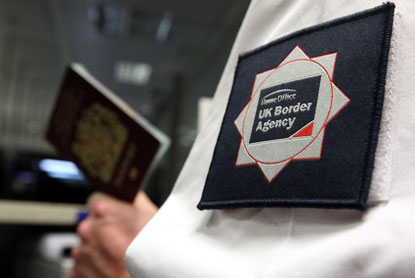Attempts to improve the performance of the UK Border Agency have been hampered by incoherent planning and the delayed delivery of a key IT project, it has been revealed today.
 The National Audit Office found that the embattled agency, which was split in two earlier this year, has achieved both cost reductions and performance improvement since 2009, but could have made faster progress.
The National Audit Office found that the embattled agency, which was split in two earlier this year, has achieved both cost reductions and performance improvement since 2009, but could have made faster progress.In 2011/12, the UK Border Agency and Border Force together spent £2.17bn, down from £2.44bn in 2008/9 as a result of the ongoing efficiency drive.
By automating processes and becoming more flexible, the agency aims to cut costs by at least a further £350m between 2011 and 2015. The business plan for this period also sets out a proposed reduction in staff of 4,500 full time equivalent posts, compared to 2010/11.
However, auditors warned that these reform plans lack details, such as exactly how the handling of immigration cases will change.
The agency, which has been recently criticised for lengthy immigration queues at Heathrow ahead of the London Olympics, is also relying on the successful implementation of the £385m Immigration Case Work IT system, the NAO found.
The new system was expected to be introduced in 14 stages over five years from 2009 to create a single end-to-end case working process that would lead to efficiency savings. However, the implementation is a year behind schedule and exceeded its original 2011/12 budget by £28m.
Despite the delay, staff levels were reduced more quickly than planned, with 2,100 full-time equivalent workers leaving during the same year. This led to a need to hire new staff to deal with spikes in demand.
The report also criticised the leadership of the agency, warning that good communication of the changes has ‘not been evident enough to date’.
Only one-quarter of staff believe that its board has a clear vision for the future, while fewer than one in five consider that the organisation manages change well.
Auditors also highlighted ‘well-documented’ problems within the Border Force. Home Secretary Theresa May announced in February that it would be split off from UKBA after it was revealed that some immigration checks had been suspended.
The split took place on March 1, but transitional arrangements to establish two separate organisations will not be complete until autumn 2012.
Auditor general Amyas Morse said that the both the agency and the force ‘face a steep climb to ensure this work delivers both value for money and a good service’.
He added: ‘The real leadership test will be whether the agency can transform casework processing without relying solely on new IT, and whether the Border Force can improve its workforce practices and raise productivity.’
Responding to the report, a Home Office spokesman said: 'We're under no illusions about the scale of the challenge in transforming the UK Border Agency and Border Force and we have already saved huge sums of taxpayers' money, overhauled our business planning and improved performance in key areas of our work.
'Both organisations have now been reorganised into smaller, more focused agencies capable of delivering the further improvements that the public expects and deserves to see.'



















